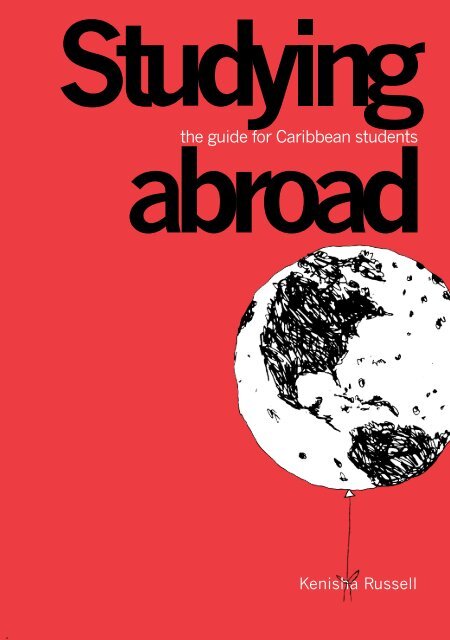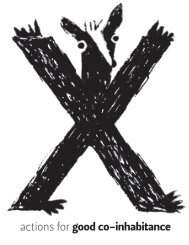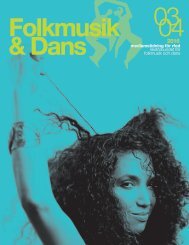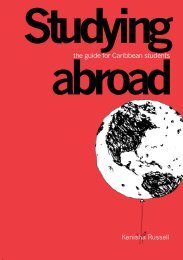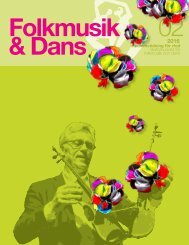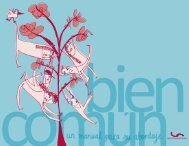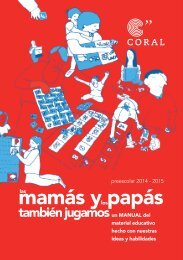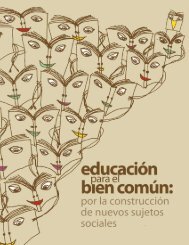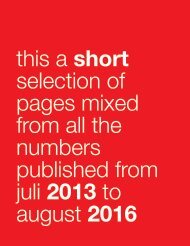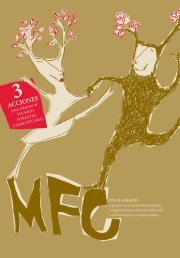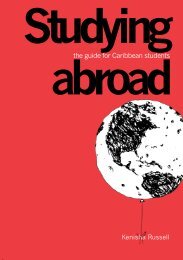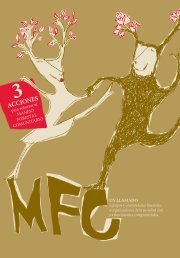studying abroad
book design
book design
- No tags were found...
Create successful ePaper yourself
Turn your PDF publications into a flip-book with our unique Google optimized e-Paper software.
Studying<br />
the guide for Caribbean students<br />
<strong>abroad</strong>
UGGLA<br />
Studying<br />
the guide for Caribbean students<br />
<strong>abroad</strong><br />
Kenisha Russell
Application guidelines 51<br />
DOCTORAL DEGREES<br />
Master of RESEARCH<br />
(MRES)<br />
As stated on the previous page this<br />
degree is awarded on completion<br />
of a project work (dissertation),<br />
which is approximately 35,000-<br />
40, 000 words with extensive<br />
SEVERAL POST-<br />
GRADUATE<br />
QUALIFICATIONS<br />
bibliography. In the United<br />
Kingdom, this graduate degree is<br />
available in a range of academic<br />
disciplines. It differs from the MPhil<br />
in that it is more organized and<br />
structured by department or advisor<br />
that provides extensive guidance.<br />
Application<br />
requirements<br />
for master´s<br />
The Application process is similar<br />
to that of undergraduate studies.<br />
Please see previous section:<br />
UNDERGRADUATE STUDIES.<br />
This may be classified as a<br />
PhD (or a Dphil). This is the<br />
most well known research<br />
qualification. The normal time for<br />
completion is between 3-4 years,<br />
even allowing for differences<br />
between and among countries.<br />
Some doctoral programmes now<br />
include a taught element and<br />
it may be started immediately<br />
following a first degree or after<br />
a master´s course. But, it is the<br />
norm for individuals who would<br />
like to complete doctoral studies<br />
in the Arts and Humanities to first<br />
complete a Master´s course.<br />
Where should<br />
i study?<br />
As advised in the previous section,<br />
the choice of which country to<br />
study is an individually based<br />
decision. There are a plethora of<br />
factors that should be considered<br />
before you make a final decision;<br />
factors such as:<br />
• The academic requirements.<br />
• Availability of funding.<br />
•The type of course you are<br />
considering.<br />
•The modes of study available; that<br />
is, the type of postgraduate degree<br />
you would like to complete.<br />
•Visa requirements.<br />
• The quality of the course and the<br />
quality of the institution.<br />
• The recognition of available<br />
research facilities.<br />
• Personal considerations; if you<br />
are able to work on graduate<br />
assistantships, how you will cover<br />
living expenses.<br />
Choosing the right<br />
working environment<br />
In addition, based on the<br />
descriptions of the varying types of<br />
course you should ask yourselves<br />
these questions:<br />
• Will I be working in a<br />
group setting or individually?<br />
Completing research alone can be<br />
very isolating and requires a huge<br />
amount of motivation. You should<br />
give thought to the conditions<br />
under which you work best.<br />
• Make an effort to meet or<br />
learn more about the professors<br />
who will supervise your research.<br />
It is integral to have a good basis<br />
of understanding to build a
Canada<br />
James Gosling / inventor of JAVA<br />
chapter 2
Canada<br />
COUNTRY OVERVIEW<br />
65<br />
GREENLAND<br />
ICELAND<br />
Newfoundland<br />
and Labrador<br />
Quebec<br />
brunswick<br />
Nova Scotia<br />
ottawa<br />
Despite intensive immigration<br />
of skilled and highly<br />
trained peoples to Canada,<br />
the country is still facing a skills<br />
shortage. So if you have a vision<br />
of the career path you would like<br />
to pursue and, if your area of<br />
NOT JUST TO TRAIN<br />
STUDENTS BUT TO<br />
RETAIN THEM.<br />
the second largest country in the<br />
world, with a land mass of 9.9<br />
million square kilometers. It is<br />
situated north of the United States<br />
between the Atlantic and Pacific<br />
Oceans. The landscape is varied<br />
and extensive; it includes flat<br />
prairies, mountainous and<br />
coastal regions and frozen<br />
landscapes.<br />
ALASKA<br />
yukon<br />
Territory<br />
Nunavut<br />
Northwest<br />
territories<br />
british<br />
Columbia<br />
Alberta<br />
Saskatchewan<br />
Manitoba<br />
ontario<br />
UNITED STATES<br />
oF AMERICA<br />
interest is in any way related to<br />
a long list of skill or professional<br />
areas needed in Canada, then this<br />
country offers one of the best and<br />
most welcoming opportunities<br />
for international students. In<br />
fact, the government has many<br />
policies in place to not just train<br />
students but to retain them.<br />
These policies are designed with<br />
the hope that, upon completing<br />
your education, you will want to<br />
remain in the country. Canada is<br />
geographically large, with most<br />
areas being culturally diverse<br />
yet not demographically dense.<br />
Canada has been categorized as<br />
MOST POPULOUS CITIES = 1 million people<br />
Toronto<br />
Ontario<br />
Montreal<br />
Quebec<br />
Vancouver<br />
British Columbia
Canada<br />
67<br />
West<br />
coast<br />
British<br />
Columbia<br />
North<br />
Yukon<br />
Nunavut<br />
Northwest t.<br />
Prairies<br />
Manitoba<br />
Saskatchewan<br />
Alberta<br />
These are the five main regions<br />
in the country. Canada is unique in<br />
that it is one of the only (if not the<br />
only) developed nation that relies<br />
as heavily on primary industry<br />
as it does on its manufacturing<br />
sector. This is as a result of the<br />
vast natural resources which<br />
are spread across varied regions<br />
of the country. As such, many<br />
educational institutions reflect this<br />
mix of industry and manufacture.<br />
For example, Canadian institutes<br />
of higher education tend to be<br />
highly regarded in fields such as<br />
engineering because of their need to<br />
Central<br />
canada<br />
Ontario<br />
Quebec<br />
atlantic<br />
Nova Scotia<br />
New Brunswick<br />
Prince Edward Island<br />
New Foundland & Labrador<br />
continuously prepare professionals<br />
with expertise on the vast untapped<br />
resources.<br />
According to the International<br />
Monetary Fund (IMF), the<br />
Canadian economy is the eighth<br />
largest in the world (2007). Its<br />
GDP was approximately $1.274<br />
trillion, with growth of 2.7%. It<br />
is part of the G8 and other ‘rich<br />
clubs’ such as the OECD. Due to<br />
the world financial crisis in 2008,<br />
the economic growth was expected<br />
to slow down significantly, with<br />
national growth predicted at<br />
0.8%. The success of the Canadian<br />
economy is in large part due to a<br />
very well adjusted political climate.<br />
The government of Canada is a<br />
mix of the British parliamentary<br />
ECONOMY IS THE EIGHTH<br />
LARGEST IN THE WORLD<br />
and United States federal systems<br />
of government. There are three<br />
levels of government, these are<br />
federal, provincial and municipal,<br />
each having some overlapping<br />
responsibilities. Although the<br />
system of governance does reflect<br />
some influences from the US,<br />
Canadians consider themselves<br />
very different from Americans.<br />
The country is very multicultural,<br />
and although it has remained<br />
predominantly Catholic, there<br />
are several other faiths, including<br />
protestants and non-Christian<br />
religions. There has also been<br />
a growth of Islam, Hinduism,<br />
Sikhism and Buddhism.<br />
more info:<br />
www.gc.ca<br />
Canadian<br />
dollar<br />
C$<br />
hdr.undp.org/en/statistics<br />
www.countryreports.org<br />
www.destineducation.ca
Canada<br />
WHY CANADA?<br />
69<br />
Roberta Bondar / astronaut<br />
If you have some interest in<br />
Canada but are still not sure if<br />
this is the place to further your<br />
studies, here is a list of reasons<br />
why Canada may be considered a<br />
good study destination:<br />
• The education system in<br />
Canada is one of the best<br />
in the world<br />
Qualifications from Canada are<br />
universally recognized and there are a<br />
range of institutions and certifications<br />
that prospective students are able<br />
to chose from. You might also find<br />
SOME OF THE LOWEST<br />
TUITION FEES AMONG<br />
ENGLISH-SPEAKING<br />
COUNTRIES<br />
it interesting that Canada has some<br />
of the lowest tuition fees among the<br />
English–speaking countries.<br />
• Strong government support<br />
Due to the Canada’s desire<br />
to have a more coherent and<br />
competitive educational system<br />
the government, with the backing<br />
of the Association of Universities<br />
and Colleges of Canada, is<br />
attempting to attract international<br />
students. One of the measures<br />
introduced is the creation of a law<br />
that introduced new immigration<br />
measures that will allow<br />
international students to work for<br />
up to one year after completing<br />
their education. Another incentive<br />
is that university students are<br />
able to work on campus without a<br />
work permit.<br />
• Multicultural society<br />
As an international student<br />
you will definitely not feel<br />
like a stranger in Canada.<br />
This is because Canada<br />
has a large multicultural<br />
community. Canada has<br />
welcomed more than 10<br />
million migrants over the last<br />
century, while simultaneously<br />
promoting Canadian values. The<br />
country has adopted a policy of<br />
multiculturalism which works<br />
to promote and preserve the<br />
traditions of the various migrant<br />
communities.
Canada<br />
75<br />
General<br />
requirements<br />
Language<br />
requirements<br />
Though Canada is officially<br />
bilingual, prospective students are<br />
not required to be able to speak<br />
both languages. The language<br />
requirement is largely dependent<br />
on the university to which you<br />
apply. You will be required to<br />
show proficiency in the language<br />
SHOW PROFICIENCY IN<br />
THE DAILY LANGUAGE<br />
of daily operation * . Canadian<br />
French language universities<br />
normally assess individuals<br />
on a case by case basis. On the<br />
other hand, English language<br />
universities have a set criteria.<br />
On the preceding pages you will<br />
find general requirements for<br />
English language proficiency<br />
certification but do remember to<br />
double-checked with individual<br />
universities. Applicants who<br />
have not completed three or more<br />
years of post-secondary work<br />
at a Canadian institution or at<br />
an institution at which English<br />
was the primary language of<br />
instruction, or have not<br />
been employed for a<br />
similar period of time in a<br />
position in which English<br />
was the primary language<br />
of business, will be required to<br />
provide certification of English<br />
language proficiency.<br />
Frank O´Gehry / architect<br />
* Individual departments or institutions<br />
may require higher scores. Test scores are valid for<br />
two years from the test date. Test results must be sent<br />
directly to the admissions office.<br />
Language schools:<br />
www.languagescanada.ca
Canada<br />
77<br />
• Accepted examinations<br />
and required scores:<br />
Test of English as a Foreign Language<br />
TOEFL<br />
• plus Test of Written English (TWE) or<br />
• Computer-based TOEFL plus Essay or<br />
• Internet-based TOEFL<br />
(offered through the Educational Testing<br />
Service, Princeton, NJ, USA)<br />
• 550 minimum overall score with a minimum of 50 in each section<br />
plus 4.0 minimum for the TWE; or<br />
• Computer-based minimum overall score of 213<br />
plus 4.0 minimum for the Essay; or<br />
• Internet-based minimum overall score of 90<br />
plus 24 minimum in Speaking and Writing sections,<br />
except the following Engineering departments:<br />
Chemical Engineering<br />
Civil and Environmental Engineering<br />
Electrical and Computer Engineering<br />
Mechanical and Mechatronics Engineering<br />
Systems Design Engineering<br />
minimum overall<br />
score requirement:<br />
80 with minimum<br />
section scores of:<br />
22 in Writing<br />
20 in Speaking<br />
20 in Reading<br />
and 18 in Listening.<br />
Michigan English Language<br />
Assessment Battery<br />
MELAB<br />
85 minimum overall score; minimum of 80 in each section<br />
International English<br />
Language Testing System<br />
IELTS<br />
6.5 minimum overall score; minimum 5.5 in each section<br />
more info:<br />
www.ielts.org<br />
www.melab.ca<br />
www.cael.ca<br />
www.cantest.uottawa.ca<br />
Canadian Academic English<br />
Language Assessment<br />
CAEL<br />
Canadian Test of English for Scholars<br />
and Trainees<br />
CanTEST<br />
70 minimum overall score; minimum 60 in each section<br />
4.5 minimum overall score; minimum 4.0 in each section
United Kingdom<br />
121<br />
United<br />
Kingdom<br />
Doris Lessing / writer<br />
chapter 3
United Kingdom<br />
129<br />
ADMISSION<br />
AND funding<br />
Norman Foster / architect<br />
Traditionally, students from<br />
the Caribbean tend to<br />
mistakenly regard England<br />
as the United Kingdom. However,<br />
as previously stated, the UK is<br />
divided into four geographic<br />
regions. In general the admission,<br />
scholarship and visa information<br />
for all four geographies is the<br />
same. These four<br />
regions mean that<br />
there are other<br />
options, including<br />
but not limited to<br />
England, which you<br />
could consider. All<br />
four regions are considered in<br />
this chapter so as to provide you<br />
with the information you need for<br />
informed decision making.<br />
The British higher education<br />
system is based on a series of<br />
lectures, seminars, tutorials and<br />
self-directed study; which exposes<br />
students to a wide range of<br />
learning techniques and provides<br />
added preparation for the working<br />
world. Students who are coming<br />
from Caribbean countries with<br />
curriculum models based on the<br />
British system will be familiar with<br />
much of the educational customs;<br />
for example, the British academic<br />
year is divided into three terms<br />
(autumn, winter and spring).<br />
Each term is approximately 10 to<br />
12 weeks, with 3 week breaks in<br />
between each term.<br />
THE BRITISH EDUCATION<br />
SYSTEM EXPOSES STUDENTS<br />
TO A WIDE RANGE OF<br />
LEARNING TECHNIQUES<br />
At some universities, particular<br />
subjects require students to<br />
complete a foundation course<br />
first adding extra time to the<br />
normally required three years<br />
for undergraduate studies. A<br />
foundation course consists of a<br />
class or a number of classes that<br />
bring the student up to university<br />
level of understanding in the<br />
subject area, before commencing<br />
core courses of the degree. Degrees<br />
can be awarded for study of a<br />
single academic subject (single<br />
honours), a combination of two
United Kingdom<br />
133<br />
Entry requirements vary by<br />
course and institution as such<br />
these are general requirements.<br />
For example, students applying<br />
to art and design courses are<br />
required to provide copies of a<br />
portfolio or examples of work.<br />
Therefore, you should check<br />
the entry requirements for each<br />
selected course carefully. Entry<br />
requirements can be checked by:<br />
• looking at the profile information<br />
in the course search window on<br />
the UCAS or hot courses website,<br />
• checking the course prospectus,<br />
• contacting university or college<br />
admissions department<br />
Entrance requirements<br />
Students should also check their<br />
qualifications (including any for<br />
which they are currently <strong>studying</strong>)<br />
with the universities and colleges<br />
they want to apply to.<br />
Transcripts<br />
Prospective students will be<br />
required to provide institutions<br />
with certificates/transcripts<br />
that show that they have passed<br />
all of the required exams. The<br />
institutions may ask that these be<br />
translated into English, if your<br />
country’s main language is not<br />
English. Also check with their<br />
university or college on whether<br />
they need the originals or certified<br />
photocopies.<br />
LANGUAGE<br />
REQUIREMENTS<br />
The United Kingdom institutions<br />
accept a wide range of exams to assess<br />
an individuals’ English language<br />
proficiency. Listed below are a<br />
few that are very prevalent in the<br />
Caribbean. *<br />
University of Cambridge<br />
International Examinations<br />
CIE<br />
International English<br />
Language Testing System<br />
IELTS<br />
Test of English as a Foreign Language<br />
TOEFL<br />
* Be aware that there are other options.<br />
more info:<br />
TOEFL<br />
www.ets.org/toefl<br />
www.ets.org/toefl/locations<br />
institutions that accept<br />
TOEFL<br />
www.ets.org/toefl/ukdirectory<br />
Tests to assess English<br />
language proficiency<br />
www.ucas.com/students/<br />
nonukstudents/englangprof<br />
There is one fundamental<br />
difference in the higher<br />
education system in the UK:<br />
In England, Northern Ireland<br />
and Wales the undergraduate<br />
studies normally take 3<br />
years to complete, while in<br />
Scotland the length of study<br />
is 4 years.<br />
• GCE O Level English Language (grade C or above).<br />
• IGCSE First Language English (Syllabus number 0500) - grade C or above.<br />
• IGCSE English as a Second Language (Syllabus number 0510) - grade C or above.<br />
Regulated by Cambridge ESOL, the British Council and the International<br />
Development Programme Education Australia. Most UK HEIs require an overall<br />
score of 5.0-7.5, depending on the content of the course. The test report form is<br />
considered valid for two years and candidates receive a band score for each of the<br />
following skill areas: reading, writing, listening and speaking. Applicants should<br />
offer academic rather than general training, reading and writing modules.<br />
The TOEFL (Test of English as a Foreign Language) test is offered in internet-based<br />
(iBT) and paper-based (PBT) formats. The TOEFL iBT consists of four sections:<br />
Reading, Listening, Speaking and Writing, and the entire test is four hours long.<br />
Scores are divided according to the four sections and an overall total score is<br />
provided. The test is recognised and accepted in over 6000 institutions globally. View<br />
the complete list of universities and colleges that accept TOEFL at www.ets.org/<br />
toefl/ukdirectory. Each institution will list their TOEFL score requirements on their<br />
website and these may vary.
United Kingdom: Scotland<br />
189<br />
Working<br />
while<br />
<strong>studying</strong><br />
Scotland has many part-time<br />
vacancies available for students,<br />
particularly in the service sector.<br />
Working on a part-time basis will<br />
enable you to earn some extra<br />
money while you study. The work<br />
experience you gain may not<br />
necessarily be in the area in which<br />
you intend to seek employment<br />
after you complete your studies.<br />
It does, however, give you the<br />
opportunity to learn and practice<br />
transferable skills that will look<br />
good on your CV when applying<br />
for jobs back home after you<br />
graduate.<br />
Work after<br />
studies<br />
In the summer of 2005, Scotland<br />
launched the Fresh Talent<br />
Scheme. The Fresh Talent<br />
Working in Scotland Scheme<br />
applies to any student who<br />
successfully completes a HND,<br />
undergraduate degree course,<br />
master’s, PhD, postgraduate<br />
certificate or diploma at a<br />
Scottish further or higher<br />
education institution to apply<br />
to stay in Scotland for up to<br />
two years after completing their<br />
studies in order to work. There<br />
are no restrictions on the type of<br />
paid work.<br />
more information:<br />
www.scotlandistheplace.com
Wales<br />
chapter 3.4<br />
Michel Kaiser / Marine biologist
United Kingdom: Wales<br />
COUNTRY OVERVIEW<br />
193<br />
60km<br />
Ceredigion-Cardiganshire<br />
Pembrokseshire<br />
North Wales Coast<br />
and borderlands<br />
Anglesey<br />
and<br />
Snowdonia<br />
Carmarthenshire<br />
Mid Wales<br />
and brecon<br />
beacons<br />
ENGLAND<br />
Wales is approximately two<br />
hours west of London<br />
by rail or by road.<br />
Although it is not a long journey<br />
you will find that Wales is a very<br />
different place. First, there is a<br />
difference in language. Although<br />
English is spoken in Wales, the<br />
Welsh also have their own local<br />
language. It is one of the oldest in<br />
Europe, spoken fluently by about<br />
one in every five persons in the<br />
population. The landscape is also<br />
english is spoken,<br />
but the welsh also<br />
have their own local<br />
language.<br />
Swansea, Gower and the Vale of Neath<br />
Cardiff and Coast, & Valleys of South Wales<br />
Wye Valley<br />
and Vale of Usk<br />
very different in character from the<br />
countryside in the England. The<br />
facts and figures might lead you<br />
to believe that Wales is small, but<br />
it covers an area of around 8,000<br />
square miles (or 20,800 square<br />
kilometres). But if you were to roll<br />
it out flat, as the locals normally<br />
say, it would be bigger than Texas.<br />
The vast outdoor spaces offers
United Kingdom: Wales<br />
197<br />
that combine the expertise of<br />
education institutions with the<br />
worlds leading companies, such<br />
as the Institute of Advanced<br />
Telecommunications and the<br />
Institute of Life Science; both at<br />
Swansea University.<br />
more information:<br />
UCAS<br />
www.ucas.co.uk<br />
Home office<br />
www.bia.homeoffice.gov.uk<br />
admission<br />
Llantwit Road, Treforest,<br />
Pontypridd, CF37 1DL<br />
Castle Grounds, Cathays Park,<br />
Cardiff CF10 3ER<br />
Old College, King Street,<br />
Aberystwyth SY23 2AX<br />
Bangor, LL57 2DG<br />
Lampeter SA48 7ED<br />
Singleton Park, Swansea SA2 8PP<br />
Western Avenue, Llandaff,<br />
Cardiff CF5 2YB<br />
College Crescent, Caerleon,<br />
Newport NP18 3YG<br />
Plas Coch,<br />
Wrexham LL11 2AW<br />
Mount Pleasant, Swansea SA1 6ED<br />
Carmarthen SA31 3EP<br />
Cathays Park, Cardiff CF10 3NS<br />
18 Custom House Street,<br />
Cardiff CF10 1AP<br />
and funding<br />
Welsh universities<br />
Each university in Wales<br />
offers on-line search facilities<br />
to find information on all<br />
courses. However, like the rest of<br />
the UK, applications can be made<br />
at the UCAS website.<br />
www.glam.ac.uk<br />
www.rwcmd.ac.uk<br />
www.aber.ac.uk<br />
www.bangor.ac.uk<br />
www.lamp.ac.uk<br />
www.swan.ac.uk<br />
www.uwic.ac.uk<br />
www.newport.ac.uk<br />
www.newi.ac.uk<br />
www.sihe.ac.uk<br />
www.drindod.ac.uk<br />
www.wales.ac.uk<br />
www.open.ac.uk<br />
visa and<br />
immigration<br />
The regulations are the same<br />
as the rest of the UK. Please<br />
see Home office website.<br />
University of Glamorgan<br />
Royal Welsh College<br />
of Music and Drama<br />
Aberystwyth University<br />
Bangor University<br />
University of Wales, Lampeter<br />
Swansea University<br />
University of Wales Institute,<br />
Cardiff<br />
University of Wales, Newport<br />
Glyndwr University<br />
Swansea Metropolitan University<br />
Trinity University College<br />
University of Wales<br />
Open University in Wales
Community<br />
Elizabeth Higginbotham / Professor of Sociology<br />
chapter 4.1<br />
colleges
United States 229<br />
special<br />
interest<br />
programmes<br />
• dance<br />
Basic skill<br />
programmes<br />
Teach academic and fundamental<br />
skills necessary for tomorrow’s<br />
job problem solving, negotiating,<br />
organizing, creative thinking,<br />
listening, and leadership.<br />
ADULT AND<br />
VOCATIONAL<br />
EDUCATION<br />
TECHNICAL AND<br />
JOB TRAINING<br />
PROGRAMMES<br />
• music<br />
• art<br />
• motive technology<br />
• aviation and aeronautics<br />
• building and construction business<br />
• electronics<br />
• emergency medical technology<br />
• police and fire department training<br />
• child and family studies<br />
• other areas with promising careers<br />
ABBE<br />
Adult Basic<br />
Education<br />
AHS<br />
Adult High<br />
School<br />
Comp. Ed.<br />
Compensatory<br />
Education<br />
ESL<br />
English as<br />
a Second<br />
Language<br />
designed for those individuals who<br />
would like to improve basic skills in<br />
reading, math, and language.<br />
Alternative to GED completion: leads<br />
to a high school diploma<br />
for adults with mental retardation<br />
or adults functioning on a level<br />
equivalent to mental retardation<br />
resulting from brain injury<br />
University<br />
transfer<br />
programmes<br />
• dual enrollment, “2+2”<br />
GED<br />
General<br />
Equivalency<br />
Diploma
United States<br />
243<br />
Ranger College<br />
San Jacinto College<br />
South Plains College<br />
South Texas College<br />
Southwest Texas Junior College<br />
Tarrant County College<br />
Temple College<br />
Texarkana College<br />
Texas Southmost College (partnered<br />
with University of Texas-<br />
Brownsville)<br />
Texas State Technical College Syst<br />
Harlingen<br />
Marshall<br />
Waco<br />
West Texas<br />
Texas State University System (+)<br />
Lamar Institute of Technology<br />
Lamar State College-Orange<br />
Lamar State College-Port Arthur<br />
Trinity Valley CC<br />
Tyler Junior College<br />
Marshall Community & Tech C.<br />
New River Community & Tech C.<br />
Pierpont Community & Tech C.<br />
SW Virginia Community & Tech C.<br />
WVirginia NorthernCC<br />
W Virginia State C & Tech C.<br />
Huntington Junior College<br />
Potomac St College of WV Univ<br />
• WISCONSIN<br />
College of the Menominee Nation<br />
Lac Courte Oreilles Ojibwa CC<br />
Wisconsin Tech College System<br />
Blackhawk Technical College<br />
Chippewa Valley Tech College<br />
Fox Valley Tech College<br />
Gateway Tech College<br />
Lakeshore Tech College<br />
Madison Area Tech College<br />
Mid-State Tech College<br />
Milwaukee Area Tech College<br />
Moraine Park Tech College<br />
Nicolet Area Tech College<br />
Vernon College<br />
Victoria College<br />
Wade College<br />
Weatherford College<br />
Western Texas College<br />
Wharton County Junior College<br />
• VERMONT<br />
Community College of Vermont<br />
Landmark College<br />
Sterling College<br />
• VIRGINIA<br />
Richard Bland College<br />
Virginia CC System<br />
Blue Ridge CC<br />
Central Virginia CC<br />
Dabney S. Lancaster CC<br />
Danville CC<br />
Eastern Shore CC<br />
Germanna CC<br />
J. Sargeant Reynolds CC<br />
John Tyler CC<br />
Northcentral Tech College<br />
Northeast WI Tech College<br />
Southwest WI Tech College<br />
Waukesha County Tech College<br />
Western Tech College<br />
University of WI Colleges (+)<br />
Baraboo / Sauk County<br />
Barron County<br />
Fond du Lac<br />
Fox Valley<br />
Manitowoc<br />
Marathon County<br />
Marinette<br />
Marshfield / Wood County<br />
Richland<br />
Rock County<br />
Sheboygan<br />
Washington County<br />
Waukesha<br />
• WYOMING<br />
Wyoming CC Commission<br />
Casper College<br />
Lord Fairfax CC<br />
Mountain EmpireCC<br />
New River CC<br />
Northern Virginia CC<br />
Patrick Henry CC<br />
Paul D. Camp CC<br />
Piedmont Virginia CC<br />
Rappahannock CC<br />
Southside Virginia CC<br />
Southwest Virginia CC<br />
Thomas Nelson CC<br />
Tidewater CC<br />
Virginia Highlands CC<br />
Virginia Western CC<br />
Wytheville CC<br />
• WEST VIRGINIA<br />
Community & Technical College<br />
System of West Virginia<br />
Blue Ridge C & Technical C<br />
Community & Tech C at West<br />
Virginia Univ Inst of Tech<br />
EW Virginia C & Tech C.<br />
Central Wyoming College<br />
Eastern Wyoming College<br />
Laramie County CC<br />
Northwest College<br />
Sheridan College (N WY CC Dist)<br />
Western Wyoming CC<br />
• PUERTO RICO<br />
Huertas Junior College<br />
Instituto Comercial de Puerto Rico<br />
Junior College<br />
(+) : 2-year campuses
Universities<br />
chapter 4.2<br />
Joan Herbers / zoologist
United States<br />
253<br />
average cost<br />
for a postgraduate<br />
application is $70 usd<br />
Average costs *<br />
US Universities fall under<br />
two major categories: public<br />
(state supported), and private<br />
(independent) institutions.<br />
International students’ tuition<br />
expenses at state schools are based<br />
on non-resident costs, which are<br />
still usually less expensive<br />
than those of private<br />
universities. The cost of a<br />
programme in a US school<br />
does not necessarily affect<br />
its quality. A brief idea<br />
on the difference in cost may be<br />
derived from the table to the left: **<br />
University<br />
type<br />
private<br />
private<br />
state<br />
state<br />
cost<br />
high<br />
low<br />
high<br />
low<br />
average<br />
USD<br />
25 000<br />
15 000<br />
20 000<br />
10 000<br />
* Keep increases in perspective. All numbers<br />
are approximate figures.<br />
** Tuition fee differs according to the<br />
universities and varies widely with courses. It can<br />
vary from as low as $5000 a year for state universities<br />
to as much as $30000 per annum for some private<br />
universities. For more specific details, please contact<br />
the universities.<br />
Marita Bolles / contemporary music composer<br />
The following list of<br />
universities does not contain<br />
all the universities in the U.S.,<br />
we only list states that are<br />
usually populated by caribbean<br />
nationals.
Denmark<br />
Reinhardt Møbjerg Kristensen / expert on the microscopic tardigrades<br />
chapter 5
Denmark<br />
319<br />
Una Canger / linguist specializing in languages of Mesoamerica<br />
must apply and have been granted<br />
a residence permit before you<br />
arrive in Denmark. To be granted a<br />
residence permit, you must be able<br />
to document your:<br />
• Enrolment into a course of<br />
further education which is<br />
approved by a state authority<br />
or which is offered by a stateapproved<br />
educational institution<br />
• Ability to support yourself<br />
during the programme and show<br />
proof of being able to pay the<br />
tuition<br />
• Competency in speaking and<br />
understanding the language used<br />
to teach the course.<br />
The immigration rules emphasize<br />
that normally, students must have<br />
obtained a residence permit before<br />
entering Denmark. You can submit<br />
your application in your country of<br />
origin, or in the country where you<br />
have resided permanently for the<br />
past three months. Please see a list<br />
of Danish consulates located in the<br />
Caribbean at the end of this chapter.<br />
If there is no consulate situated<br />
in your home country, contact the<br />
Danish Immigration Services:<br />
The Immigration Service<br />
Ryesgade 53<br />
2100 Copenhagen Ø<br />
Denmark<br />
Tel: 004523308587<br />
Email: study@us.dk<br />
Although the norm is to apply for<br />
the residence permit outside of<br />
the country, in certain cases it is<br />
possible to submit an application<br />
in Denmark but this depends on<br />
your grounds for being in the<br />
country. For instance, if you were<br />
granted a residence permit on<br />
grounds other than study, then you<br />
can apply for a residence permit<br />
while in the country. If you wish<br />
to apply for a residence permit<br />
as a student, both you and the<br />
educational institution in Denmark<br />
must supply information for the<br />
processing of your application.<br />
Once you have been accepted the<br />
educational institution in Denmark<br />
will begin the application process<br />
by completing their part of the<br />
application form and attaching<br />
the required documents. This<br />
paperwork will then be sent or<br />
see the list of danish<br />
consulates in the<br />
caribbean<br />
given to you with the attached<br />
documents. Then you should<br />
complete your part of the form,<br />
attach the rest of the required<br />
documents, and submit the entire<br />
application to the embassy or<br />
consulate in the country of your<br />
residence.<br />
Required<br />
documentation<br />
*<br />
Applicants should submit the<br />
following documentation a<br />
minimum of 2-3 months prior<br />
to departure. The application<br />
form (ST1) contains a detailed<br />
description of how you and the<br />
* The Consulate General advises against<br />
making any final travel arrangements, particularly<br />
purchase of non-refundable air tickets for a specific<br />
date, prior to approval of your visa application.
Denmark<br />
work permits<br />
323<br />
Family visa<br />
If you have been granted a<br />
residence permit as a student on a<br />
higher educational programme for<br />
three years or more, your family<br />
can normally accompany you to<br />
Denmark. It is a requirement that<br />
your family can support itself<br />
throughout the entire period, and that<br />
you will all live at the same address.<br />
However, your partner or spouse is<br />
allowed to work full time during his<br />
or her stay in Denmark.<br />
Working<br />
while<br />
<strong>studying</strong><br />
All students from outside the<br />
European Union are automatically<br />
granted a permit to work for<br />
a total of 15 hours per week<br />
during the school term. During<br />
holiday months students will be<br />
granted permission to work fulltime;<br />
that is, full time work in<br />
June, July and August. Danish<br />
employers require high levels of<br />
qualifications for employees and so<br />
it is sometimes challenging to find<br />
part time employment. Therefore,<br />
prospective students would have<br />
to be persistent.<br />
Work after<br />
studies<br />
If you complete a higher<br />
educational programme in<br />
Denmark, the immigration services<br />
will normally grant you a grace<br />
period for you to find suitable<br />
employment. If you do find an<br />
organization willing to employ<br />
you, they are then able to apply for<br />
a work and residence permit on<br />
your behalf.<br />
Embassies<br />
in the<br />
Caribbean<br />
+53 (7) 338 128<br />
Paseo de Marti (Prado) 20<br />
Cuba<br />
+ 53 (7) 8668144<br />
Piso 4, Apt. 4 B Zona 2<br />
Fax: +53 (7) 338 127<br />
10200 Havana, Cuba<br />
dancons@enet.cu<br />
Phone: +1 (809) 732 1234<br />
Jose Amado Soler 49<br />
Dominican Republic<br />
Fax: +1 (809) 541 2743<br />
Edificio Gampsa Piso 1<br />
Santo Domingo<br />
dmnconsul@maersk.com<br />
Phone: +509 223 2551<br />
35, Ave. Marie-Jeanne<br />
Haiti<br />
Fax: +509 222 5156<br />
P.O. Box 1334<br />
Port-au-Prince<br />
shmadsen@hotmail.com<br />
Phone: +1 876 923 5051<br />
449 Spanish Town Road<br />
Jamaica<br />
Fax: +1 876 923 5055<br />
Kingston 11<br />
rammoja@mail.infochan.com<br />
Phone: +1 868 624 3587<br />
21 Ferndale Terrace<br />
Trinidad and Tobago<br />
Fax: +1 868 627 44804000<br />
St. Anns<br />
Port-of-Spain, Trinidad and Tobago
Denmark<br />
325<br />
EMPLOYMENT:<br />
VACANCY SOURCES<br />
Niels Kaare Krabbe / ornithologist and bird conservationist<br />
Hidden<br />
vacancies<br />
There are many opportunities to<br />
work in Denmark and it takes an<br />
astute and persistent individual<br />
to carry out a fruitful job search.<br />
Unlike many other developed<br />
countries, the typical way to<br />
apply for a job in Denmark is to<br />
use a Cover letter and CV but<br />
the accompanying evidence is<br />
also integral to the application<br />
process; relevant certification,<br />
copies of qualification and referee<br />
letters from previous employers<br />
should be sent along with your<br />
application letter.<br />
In-depth research on the company<br />
to which you are applying is<br />
equally important as it increases<br />
your chance of being hired. Use<br />
as many resources as possible to<br />
find company information if you<br />
are seeking to send speculative<br />
letters. Look at company<br />
directories and the yellow pages.<br />
These are available free of cost<br />
in Danish libraries, for example<br />
The Copenhagen Business<br />
School Library may be a useful<br />
resource. It is an academic library<br />
which holds information on<br />
various types of businesses and<br />
career areas such as accounting,<br />
advertising, banking and finance,<br />
research the<br />
company to which<br />
you are applying<br />
computer science, foreign trade,<br />
law, marketing, statistics and<br />
social sciences sectors. Your<br />
research should be reflected in<br />
the fact that your application or<br />
cover letter must be directed to a<br />
specific person at the company;<br />
otherwise, your application may<br />
be discarded.<br />
It is important to note all other<br />
elements to creating a job<br />
application (the general rules<br />
on cover letters and CV) as<br />
presented in CHAPTER 11-<br />
WORKING ABROAD.
Denmark<br />
327<br />
Danish CV<br />
CVs should be kept brief and<br />
factual with work experience<br />
being viewed as more important<br />
than extra-curricular activities.<br />
A Danish CV should be in the<br />
following order:<br />
• Begin with your name, address,<br />
and contact information.<br />
• Business qualifications follow,<br />
based on the requirements listed<br />
in the job advertisement, with<br />
work experience sequenced<br />
to match your business<br />
qualifications.<br />
• Education.<br />
• Personal information, including<br />
date of birth, marital status,<br />
number of children,<br />
• Nationality (as a non-native it<br />
is advisable to clarify your work<br />
permit status)<br />
• Finally, you should briefly list<br />
your outside interests.<br />
• Newspapers<br />
As in most countries, job<br />
advertisements appear in the<br />
Sunday editions of the newspapers.<br />
The Kidon Media-Link website is a<br />
one stop shop for links to various<br />
regional Danish newspapers. The<br />
main newspapers for adverts are:<br />
• The English weekly paper<br />
• The Copenhagen Post<br />
• Jyllands-Posten<br />
• Politiken<br />
• Berlingske Tidende<br />
• Dansk Industri: is a weekly<br />
journal that covers a wide range<br />
of information from trade and<br />
industry relations and this may be<br />
useful in your job search.<br />
more info:<br />
www.kidon.com<br />
www.cphpost.dk<br />
www.jp.dk<br />
www.politiken.dk<br />
www.berlingske.dk<br />
www.di.dk<br />
ONLINE RECRUITMENT<br />
SERVICES AND JOB<br />
LISTINGS<br />
Jobbank<br />
www.jobbank.dk<br />
JobsInCopenhagen<br />
www.jobsincopenhagen<br />
Job opportunities with<br />
English as the main<br />
working language;<br />
Job Index Denmark<br />
www.jobindex.dk<br />
Karriere Vejviser<br />
www.karrierevejviser.dk<br />
Monster (Denmark)<br />
www.monster.dk<br />
Stepstone (Denmark)<br />
www.stepstone.dk<br />
Higher<br />
education<br />
career<br />
support<br />
Students registered at higher<br />
education institutions may want<br />
to ask for help and advice from<br />
the careers center located on their<br />
university campuses. Career<br />
support is offered in universities<br />
to graduates by student advisers<br />
and also by employment officers<br />
or labour unions. The university’s<br />
careers services is particularly<br />
focused on facilitating the<br />
transition from <strong>studying</strong> into<br />
employment and is less<br />
orientated towards providing job<br />
placements.<br />
more info:<br />
The Copenhagen Business<br />
School Library<br />
http://uk.cbs.dk/library
Denmark<br />
329<br />
Interviews<br />
This is largely dependent on<br />
the position for which you<br />
have applied and could be an<br />
individual or panel interview.<br />
Business dress is usually expected<br />
on these occasions. There is an<br />
increasing use of group activities<br />
and psychometric tests as part of<br />
the selection process, especially by<br />
larger organizations.<br />
Work<br />
patterns<br />
• Not unlike the Danish education<br />
system, the working culture is<br />
team-orientated and the working<br />
environment is characterised by<br />
open and informal manners.<br />
• The normal working week is<br />
37 hours and employees’ normal<br />
holiday entitlement is five weeks,<br />
although within the public sector<br />
this is generally six weeks.<br />
• Danish companies offer good<br />
working conditions, modern<br />
conveniences and technical<br />
equipment of a high standard.<br />
• Most workplaces offer continuing<br />
education to their employees and<br />
the development of qualifications<br />
is seen as a high priority.<br />
Hans J. Baagøe /<br />
professor researching on scandinavian bats
Finland<br />
chapter 6<br />
Markku Kulmala / Professor in Aerosol and Environmental Physics
Finland<br />
361<br />
visa and<br />
immigration<br />
International Office<br />
P.O.Box 412 (Keskuskatu 34)<br />
virve.hakamies@scp.fi<br />
Seinäjoki University<br />
of Applied Sciences (SeAMK)<br />
South Carelia Polytechnic<br />
Svenska Yrkeshögskolan<br />
Sydväst Polytechnic<br />
Tampere Polytechnic -<br />
University of Applied Sciences<br />
Turku University<br />
of Applied Sciences<br />
of Applied Sciences<br />
Vaasa University<br />
of Applied Sciences<br />
FI-60101 Seinäjoki<br />
International Office<br />
global@syh.fi<br />
Koulukatu 5 B<br />
FI-55120 Imatra<br />
P.O. Box 6 (Fabriksgatan 1)<br />
FI-65201 Vasa<br />
International Office<br />
international.office@tpu.fi<br />
P.O. Box 21 (Teiskontie 33)<br />
FI-33521 Tampere<br />
International Office<br />
int.office@turkuamk.fi<br />
Sepänkatu 3<br />
FI-20700 Turku<br />
Admissions Office<br />
hakutoimisto@puv.fi or<br />
Wolffintie 30<br />
FI-65200 Vaasa<br />
All students that would like to<br />
study in Finland for a period<br />
of more than three months<br />
are required to apply for a residence<br />
permit at a Finnish mission in their<br />
home country (Please see a list of<br />
Finnish Missions contact details at<br />
the end of this chapter). Finnish<br />
residence permits are normally<br />
granted to students who will<br />
undertake studies leading to a<br />
degree qualification or to exchange<br />
students who are supplementing<br />
their learning experience for a<br />
limited period of time. Residence<br />
permits are not normally granted<br />
to students who just want to<br />
undertake language courses.<br />
Linus Torvalds / inventor of Linux
Netherlands<br />
chapter 7<br />
Theunis Piersma / shorebird biologist
Netherlands<br />
visa and<br />
immigration<br />
395<br />
All international students who<br />
are from non-EU countries<br />
and who would like to<br />
study in the Netherlands require<br />
a visa to enter and remain in the<br />
country. All information regarding<br />
the legal entry of foreigners is<br />
outlined in what is refered to as the<br />
Aliens Law. It is advised that you<br />
obtain the document and read the<br />
information thoroughly. The three<br />
most common visas required for<br />
foreign students are:<br />
the procedure is<br />
lengthy and will take<br />
about three to six<br />
months or longer<br />
• A short-stay visa (VKV) – for<br />
visits of up 3 months stay, issued<br />
by the Dutch embassy;<br />
• An authorization for temporary<br />
stay for visits that are more than 3<br />
months stay (MVV), issued by the<br />
Dutch embassy;<br />
• A residence permit issued by the<br />
Alien Registration Office in the<br />
Netherlands after one’s arrival in<br />
the country (VTV);<br />
The universities in the Netherlands<br />
offer far-reaching assistance to<br />
students who need to complete the<br />
visa process. Some universities go<br />
as far as offering qualified students<br />
financial assistance in the form of a<br />
grant to cover the cost of their visa<br />
application.<br />
Another service that many higher<br />
education institutions offer is<br />
assistance to expedite the visa<br />
process by applying for it on your<br />
behalf. Ask your future<br />
host institution about<br />
this process. Remember,<br />
you may not, under any<br />
circumstances, collect an<br />
MVV in the Netherlands;<br />
not even if your host<br />
institution in the Netherlands<br />
initiates the application on your<br />
behalf. MVVs can only be collected<br />
at the Dutch embassy or consulate in<br />
your home country (or the country<br />
in which you legally reside).<br />
If your host institution applies for<br />
an authorization for temporary<br />
stay for you via the shorter<br />
procedure, you have to pay a<br />
handling fee of 250 Euros. If<br />
you apply for an authorization<br />
for temporary stay yourself, you<br />
have to pay a handling fee of 433<br />
Euros. Paying the fee does not<br />
automatically mean that your<br />
application will be successful.<br />
The fee is also non-refundable; it<br />
will not be returned even if your<br />
application is unsuccessful.<br />
The first step in the visa process<br />
is to apply for an Authorization<br />
for temporary stay (machtiging<br />
tot voorlopig verblij, MVV). It<br />
is extremely important to have<br />
this visa before entering the<br />
Netherlands. You can apply for<br />
an MVV at the Dutch embassy or<br />
consulate in your home country or<br />
the country in which you legally<br />
reside; that is the country in which<br />
you have resided for more than 3<br />
months. The procedure involves<br />
completing an application form<br />
along with all relevant documents.<br />
The procedure is lengthy and will<br />
take about three to six months,<br />
sometimes even longer. Therefore,<br />
as outlined in CHAPTER 1, create<br />
a timetable and ask for all relevant<br />
information during the application<br />
process in order to avoid delays<br />
due visa issues. As soon as you<br />
have your acceptance letter you<br />
should apply for your visa.<br />
After entering the Netherlands,<br />
students that are intending to stay<br />
for longer than three months are<br />
mandated to obtain a residence<br />
permit (verblijfsvergunning). If<br />
you are not a visa national but<br />
have entered the country and will<br />
remain there for more than three<br />
months, you are still required<br />
to apply for a residence permit.<br />
You or your host institution<br />
(university or university of<br />
applied sciences) has to apply<br />
for your residence permit within<br />
five days of your arrival in the<br />
Netherlands.<br />
It is important for you to arrive<br />
with the correct visa. If you are in<br />
the Netherlands on a short-stay<br />
visa, you can never be issued a<br />
residence permit. Be sure to have<br />
the correct document in your<br />
possession. A short-stay visa is for<br />
stays for three months or less, or an
Netherlands<br />
397<br />
Ben L. Feringa/Professor of Molecular Science<br />
MVV if you intend to stay for more<br />
than three months and if your<br />
nationality requires it.<br />
Required<br />
documentation<br />
The documents that are usually<br />
required for the MVV are as<br />
follows:<br />
• A valid passport<br />
• Non-criminal record.<br />
• Proof that you are no risk to<br />
public order, national peace or<br />
security.<br />
• Sufficient means of support,<br />
for example, earned income or<br />
scholarship<br />
• Tuberculosis tests.<br />
• Civic integration examination<br />
more info:<br />
www.internationalstudy.nl<br />
board pass grade or proof of<br />
exemption.<br />
• Health insurance with a Dutch<br />
insurer that covers your stay.<br />
• Proof that you are enrolled in an<br />
educational institution that has an<br />
agreement with the Immigration<br />
and Nationality department (IND).<br />
• You have sufficient long term<br />
means of support.<br />
• You are aware your stay is of a<br />
temporary nature.<br />
Student visas are approved under<br />
certain conditions, therefore your<br />
residence permit will only remain<br />
valid if you are:<br />
• Participating in a foundation<br />
course for the purpose of enrolling<br />
in a full degree programme. The<br />
residence permit will be valid for<br />
a maximum of 12 months. It is not<br />
possible to extend this visa for<br />
another period of preparation, after<br />
the prep year. However, you may<br />
apply for a regular study permit;<br />
• A student at a higher education<br />
institution. This residence permit<br />
will be valid until the end of the<br />
academic year, until September 1st.<br />
This visa may be extended once<br />
you provide proof of continued<br />
enrollment.<br />
• A student doing a traineeship,<br />
the residence permit will be valid<br />
for a maximum of 12 months. It is<br />
not normally possible to extend it.<br />
Visa<br />
extension<br />
Given that the residence permit<br />
for students are normally<br />
granted for one year intervals,<br />
students undertaking a degree<br />
programme will be required to<br />
extend the permit at least once.<br />
This may be done by sending<br />
the relevant documents and<br />
fee to the immigration services.<br />
Nevertheless, the IND usually<br />
sends a reminder letter with the<br />
relevant forms three months<br />
before the expiration of current<br />
permits. It is integral that the<br />
extension process is started before<br />
the expiration of any current visa<br />
or you may be presented with<br />
unliveable consequences.
Sweden<br />
chapter 9<br />
Hanna Dahlkvist / cellist
Sweden<br />
459<br />
Jesper Waldersten / illustrator<br />
The decision on whether to<br />
accept an applicant rests with the<br />
institutions. Make sure you satisfy<br />
all the necessary requirements<br />
before submitting an application.<br />
If you are not sure, contact the<br />
department responsible for the<br />
programme in which you have an<br />
interest directly. After the deadline<br />
passes, each institution will assess<br />
your application, based on their<br />
in-house selection procedures.<br />
Decisions are usually made based<br />
on various criteria, such as grades<br />
obtained, results from previous<br />
courses and degree projects.<br />
Given there are so many courses<br />
from which to choose, before logging<br />
in to the system, you can do a<br />
search to find degree programmes<br />
of interest to you, use the search<br />
function at the Study in Sweden<br />
webiste. Each programme or<br />
individual course has a unique<br />
application code. After you have<br />
found one or more programmes that<br />
you would like to apply to, you can<br />
then proceed to the central application<br />
system, in order to register the chosen<br />
programme (s). An added benefit of<br />
checking the courses at the Study in<br />
Sweden website is that you can learn<br />
the application codes and this is a<br />
good way to later check that you have<br />
applied to your intended programme<br />
choice. The current application<br />
processing fee is 900 Swedish Kronor.<br />
Application deadline :<br />
March 15 of each year<br />
The Swedish academic year<br />
is divided into two semesters.<br />
The autumn semester stretches<br />
from the end of August until the<br />
middle of January. The spring<br />
semester begins in the middle<br />
of January and ends mid-June.<br />
Some universities also offer single<br />
subject courses during the summer<br />
months (June-August). Application<br />
deadline for international students<br />
is March 15 of each year; this is<br />
largely to facilitate the long visa<br />
process. This deadline is rigidly<br />
enforced and all documents<br />
received outside of this deadline<br />
will not be considered as part of<br />
the application.
Sweden<br />
461<br />
General<br />
requirements<br />
LANGUAGE<br />
REQUIREMENTS<br />
Some students may be exempt from<br />
formal language tests. They are:<br />
• Students with a bachelors<br />
degree from a university where<br />
English is the main language of<br />
instruction, in accordance with<br />
the recommendations in the latest<br />
edition of International Handbook<br />
of Universities.<br />
• Students with a bachelors<br />
degree (equivalent to a Swedish<br />
kandidatexamen) where English is<br />
the main subject.<br />
• Students with 30 higher<br />
education (HE) credits from a<br />
Nordic country where the language<br />
of instruction of the course is<br />
English.<br />
more info:<br />
www.studyinsweden.se<br />
Examples of tests used<br />
and minimum scores:<br />
TOEFL<br />
Test of English as a<br />
Foreign Language<br />
IELTS<br />
International English<br />
Language Testing<br />
Service<br />
EFL<br />
Cambridge examination<br />
Melab<br />
Michigan English Language<br />
Assessment Battery<br />
scores: 500-550 (paper-based test)<br />
173-213 (computer-based test)<br />
61-79 (internet-based test)<br />
5.0-6.0 (no band lower than 4.5-5.0)<br />
grades A or B<br />
85 - 90 points<br />
• Swedish<br />
Students who would like to<br />
complete a full degree in Swedish<br />
are required to show written<br />
and oral skills meeting the level<br />
required for upper-secondary<br />
education. This prerequisite may<br />
be shown by completing the<br />
nationwide test of Swedish for<br />
university studies (TISUS.)<br />
RECOGNITION OF<br />
QUALIFICATIONS<br />
The national agency for services<br />
to universities and university<br />
colleges undertakes evaluation<br />
of completed foreign uppersecondary<br />
education. They may be<br />
contacted at:<br />
Verket för högskoleservice<br />
Box 24 070<br />
104 50 Stockholm<br />
Tel: 08-725 96 00<br />
Fax: 08-725 96 01<br />
Recognition of higher academic<br />
degrees is undertaken by Swedish<br />
NARIC, a section of the National<br />
Agency for Higher Education
Sweden<br />
465<br />
your home institution. This should<br />
not be more than two pages.<br />
• Two letters of<br />
recommendation (Mandatory):<br />
From professors/academic<br />
supervisors, describing the interest<br />
your cv should not<br />
be more than<br />
two pages<br />
of cooperation and long term<br />
impact of a study/research visit to<br />
Sweden as well as confirming the<br />
applicant’s status (holder of a PhD<br />
degree, or registered PhD student).<br />
The letter should also evaluate<br />
the applicant’s English language<br />
proficiency. This is not necessary<br />
for students/researchers working<br />
in Swedish language. These letters<br />
should be sent to the:<br />
The Swedish Institute<br />
Box 7434<br />
103 91 Stockholm<br />
Sweden<br />
All documents or the envelope<br />
should be marked with the<br />
reference number of your<br />
confirmed application. This should<br />
not be more than two pages.<br />
• Copies of university<br />
degrees (Mandatory): Copies<br />
of the highest degree obtained,<br />
translated into English and<br />
certified by the university.<br />
• Research proposal<br />
(Mandatory): A research<br />
proposal describing the<br />
scientific quality of the<br />
project as well as its<br />
originality, methodological<br />
approach and relevance. This<br />
should not be more than five<br />
pages.<br />
• CV of the applicant<br />
(Mandatory): Outlining your<br />
previous studies, degrees and<br />
English language proficiency. This<br />
should not be more than two pages.<br />
• CV of the intended<br />
supervisor/contact person in<br />
Sweden (Mandatory): This should<br />
not be more than two pages.<br />
• List of publications<br />
(Optional): This should not be<br />
more than two pages.<br />
• Personal motivation<br />
(Mandatory) : Expected long term<br />
impact and goals, choice of Sweden<br />
as your study/research destination<br />
and reasons for seeking financial<br />
support. This should not be more<br />
than one page.<br />
•It is also mandatory that<br />
Students use the application forms<br />
provided by the institute. It may be<br />
found on the Institute of Sweden’s<br />
website.<br />
more info:<br />
Swedish institute<br />
www.si.se<br />
Danica Kragic / professor of robotics
Sweden<br />
employment:<br />
vacancy sources<br />
487<br />
Swedish CV<br />
Your CV should be no longer than<br />
two pages and can be written in<br />
either chronological or reverse<br />
chronological order. It can also<br />
be written in either first or third<br />
person. The CV can be relatively<br />
comprehensive but do not write<br />
long blocks of text; bullet points<br />
with a couple of lines of text are<br />
often the norm.<br />
Heading<br />
Curriculum Vitae<br />
Meritförteckning<br />
You normally use a heading for<br />
your CV. In Swedish a CV can be<br />
called both Meritförteckning and<br />
CV, though nowadays CV is the<br />
most commonly used.<br />
Personal Information<br />
It is usually only your name and<br />
surname(s), Address, Contact<br />
telephone number/s, fax and<br />
email. This doesn´t need a<br />
heading on its own and is often<br />
just written on the top of the CV<br />
(see example, page 488).<br />
Professional Experience<br />
Arbetserfarenheter<br />
Company name and sector. Dates,<br />
duties, achieved goals, etc.. Use<br />
the order that is better for you<br />
depending on the experience<br />
you want to emphasize: from the<br />
oldest to the newest, or vice versa.<br />
Read more about the two ways of<br />
organizing your work experience<br />
in these two kinds of resumes.<br />
Studies<br />
Utbildning<br />
List all levels of your studies.<br />
Title, place, city, dates of studies<br />
(it’s better to list these in a<br />
chronologically inverse order).<br />
Under this section you can<br />
also include courses, seminars,<br />
congresses or conferences that are<br />
relevant in relation to the position.<br />
Long or prestigious courses are<br />
also interesting. Point out its<br />
duration in hours. Do not write<br />
down the ones that are not relevant<br />
or not recent.<br />
Languages<br />
Språk<br />
Which ones and what is your level:<br />
high, medium or low. Point out if<br />
you can translate, speak or write.<br />
Computer Skills<br />
Dator erfarenhet/färdighet<br />
Programmes<br />
applications<br />
database<br />
Internet, etc.<br />
Miscellaneous<br />
Övrigt<br />
Other relevant information that<br />
you don’t know where to put,<br />
such as geographic and job<br />
mobility, driver’s license (pointing<br />
out the category), having a car,<br />
etc. Explaining your hobbies is<br />
something that you should usually<br />
try to do because that is something<br />
which tends to come up at the<br />
personal interview. It has the effect<br />
of pursuing your personality.<br />
See an example of a Swedish<br />
CV on the next page<br />
Gunnar Broberg / historian researching on animal´s relation to humans
Switzerland<br />
chapter 10<br />
Mario Botta / architect
Switzerland<br />
497<br />
The constitution also confers<br />
sovereignty - that is, supreme<br />
political power - on the<br />
population, which elects<br />
a parliament. The Swiss<br />
parliament, in turn, elects the<br />
members of the government,<br />
called a Federal Council. The<br />
country also has a legislative<br />
body, the Federal Assembly,<br />
which is composed of two equal<br />
The economy is<br />
classified as one of<br />
the most capitalist<br />
in the world<br />
chambers. The Council of States,<br />
with 46 members representing<br />
the cantons, and the National<br />
Council, with 200 members<br />
allocated according to the strength<br />
of the party.<br />
There are currently four main<br />
political parties: the Swiss People’s<br />
Party, the Radicals, the Social<br />
Democrats and the Christian<br />
Democrats.<br />
For much of the twentieth<br />
century Switzerland has been the<br />
wealthiest country in Europe.<br />
Swiss residents enjoy low tax<br />
rates, in comparison to the<br />
rest of Europe, with similarly<br />
high standards of living. Yet,<br />
unlike many European states,<br />
residents are required to have<br />
insurance against unemployment,<br />
occupational accidents and<br />
occupational illness.<br />
A 2005 survey by the Swiss<br />
Federal Statistical Office<br />
found that the average<br />
Swiss spent just over a<br />
third of their household<br />
budget on taxes and<br />
insurance. Nevertheless, the<br />
strong economic performance of<br />
Switzerland could make <strong>studying</strong><br />
there rewarding experience. The<br />
country’s economy is classified as<br />
one of the most capitalist in the<br />
world and it boasts high levels of<br />
stability and modernization.<br />
The main industries are:<br />
• Pharmaceuticals<br />
• Banking and Insurance<br />
• Watch production<br />
•Tourism<br />
• Mechanical and Electrical<br />
Engineering<br />
The country has high levels of<br />
freedoms in all areas of life, and in<br />
1981 an equality law was passed<br />
to ensure equal rights between<br />
men and women. The country is<br />
a collage of various languages,<br />
religious leanings and ethnic<br />
differences. This adds to the rich<br />
cultural tapestry that makes the<br />
country unique.<br />
Switzerland’s currency is the Swiss<br />
franc (CHF). The Euro is also<br />
becoming increasingly accepted.<br />
However, transactions are mostly<br />
done in Swiss francs.<br />
more info:<br />
www.swissworld.org<br />
Swiss<br />
franc<br />
(CHF)
Switzerland<br />
why switzerland?<br />
499<br />
Kurt Wüthrich / chemist researching on proteins<br />
• Accessible education<br />
Educational programmes in<br />
Switzerland are largely accessible<br />
by a wide cross-section of<br />
people and foreigners make up<br />
a high percentage of the student<br />
population. As such, choosing<br />
Switzerland as your place of<br />
study means you will meet and<br />
associate with people from all over<br />
the world. This kind of diversity<br />
is good; it can give you a very<br />
global outlook and an impartial<br />
understanding of life.<br />
• Multicultural &<br />
multilingual country<br />
Switzerland is a multilingual<br />
country with many people being<br />
able to speak French, German,<br />
Italian, Romansh and another 1%<br />
of the population speaking other<br />
languages. If your core interest is to<br />
learn several languages, or if you<br />
would like to learn a new language<br />
or two while you study, Switzerland<br />
is a great option to consider.<br />
• Funding for<br />
postgraduates<br />
Through the Federal Commission<br />
for International Students, the<br />
government provides a small<br />
number of scholarships to foreign<br />
postgraduates only. These help<br />
students undertake research in<br />
fields that are particularly strong<br />
areas for Swiss universities.<br />
you will meet people<br />
from all over<br />
the world<br />
• Balance academic with<br />
hands-on experience<br />
Since Switzerland is a European<br />
business hub, several courses<br />
have links with locally based<br />
businesses, which give these<br />
programmes an advantage that<br />
cannot be beaten. Special strengths<br />
are in banking, machine tool and<br />
precision engineering. Other<br />
strengths include chemical and<br />
pharmaceutical engineering as well<br />
great hotel and tourist education<br />
departments. The country has<br />
been very successful in attracting<br />
the investment of foreign multinationals<br />
and businesses; and this<br />
is one of the reasons for its huge<br />
banking sector. The knock-on<br />
effect of the wealth attracts some<br />
of the most respected academics<br />
in European universities who look<br />
to enjoy the high wages<br />
and comfortable lifestyle<br />
Switzerland offers.<br />
• Doctoral students<br />
Doctoral study is<br />
considered to be<br />
employment and therefore PhD<br />
students are paid members of the<br />
workforce.<br />
more info:<br />
www.en.wikipedia.org/wiki/<br />
Switzerland<br />
www.swissworld.org<br />
www.swissinfo.org
Switzerland 517<br />
universities and subjects<br />
diploma<br />
University of Zurich<br />
• Art Market Studies<br />
• Biology: Behavioural Sciences<br />
• Biology: Developmental Biology<br />
• Biology: Ecology<br />
• Biology: Geneticser of Science<br />
• Biology: Human Biology<br />
• Biology: Microbiology<br />
• Biology: Molecular and Cellular Biology<br />
• Biology: Neurosciences<br />
• Biology: Plant Biology<br />
• Biology: Quantitative Biology and Systems Biology<br />
• Biochemistry<br />
• Economics and Business Administration: Banking and Finance<br />
• Economic s and Business Administration: Economics<br />
• Economics and Business Administration: Management and Economics<br />
• Environmental Sciences<br />
• Informatics: Multimodal and Cognitive Systems<br />
• Informatics: Software Systems<br />
• International Sports Organisations<br />
• Medical Biology<br />
EM/MAS<br />
MSC<br />
MAS<br />
MSC<br />
CAS<br />
MSC<br />
• Palaeontology<br />
• Quantitative Finance<br />
Beatrice Weder di Mauro / Economist<br />
DOCTORAL<br />
PROGAMMES<br />
To access information regarding<br />
doctoral programmes, you can<br />
log onto the Swiss universities<br />
website. Where it is possible to<br />
search for doctoral programmes<br />
by discipline or by university.<br />
The site also allows prospective<br />
students to combine their chosen<br />
programmes with the university<br />
at which it is available. The main<br />
criteria that is used to determine<br />
eligibility for a PhD programme,<br />
is the completion of a master’s<br />
degree or equivalent from a<br />
recognised or accredited university.<br />
Similar to the bachelor’s and<br />
master’s programmes, conditions<br />
for acceptance vary among<br />
universities, and interested<br />
students should check the<br />
admission requirements of their<br />
prospective university.<br />
more info:<br />
www.swissuniversity.ch.
Switzerland<br />
525<br />
work permits<br />
On arrival in Switzerland,<br />
you will have to apply to the<br />
police department dealing with<br />
foreigners, to obtain a residence<br />
permit. You must present yourself<br />
within ten days of arrival to the<br />
appropriate police department in<br />
the town where you will be living<br />
with following documents:<br />
• a valid passport, with a copy<br />
and the original of your entry visa<br />
• confirmation that you<br />
have been accepted by a Swiss<br />
university<br />
• a guarantee of sufficient<br />
financial means to support yourself<br />
during your studies (e.g. bank<br />
statement)<br />
• statement concerning your<br />
address in Switzerland<br />
Visa<br />
extension<br />
Based on the prevailing division<br />
of government services between<br />
the federal government and the<br />
cantons, the cantonal authorities<br />
are responsible for the extension<br />
of visas or the granting of aliens<br />
police residence permits. For this<br />
reason, you are required to address<br />
your enquiries regarding visa<br />
extensions directly to the cantonal<br />
migration authorities responsible<br />
for your area of residence. The<br />
procedure is similar to that of<br />
obtaining your previous residence<br />
permit.<br />
more info:<br />
www.bfm.admin.ch<br />
www.eda.admin.ch<br />
Manuela Pfrunder / designer<br />
Working<br />
while<br />
<strong>studying</strong><br />
The student resident permit does<br />
not give you the right to work. In<br />
the case of a summer internship,<br />
the local authorities have to be<br />
informed and they have to agree<br />
beforehand.<br />
Work after<br />
studies<br />
Upon the completion of your<br />
studies, you cannot work in<br />
Switzerland automatically. If a<br />
company recruits you, they need to<br />
apply for another type of residence<br />
permit for you and obtain it<br />
beforehand. Non-EU-citizens can<br />
only get a work permit if their<br />
employer proves they could not fill<br />
the respective position with a Swiss<br />
or EU citizen. This can become a
Working <strong>abroad</strong><br />
537<br />
the necessary finances. As such,<br />
students without the necessary<br />
financial means should start their<br />
job search as early as possible.<br />
Starting the job search early has<br />
a secondary function. If you are<br />
for students<br />
without the<br />
necessary<br />
financial means<br />
able to find employment prior to<br />
submitting your visa application<br />
(or while it is being considered)<br />
some countries allow this to be<br />
calculated as part of the financial<br />
burden of proof, necessary for visa<br />
issuance * .<br />
* This regulation should be checked at the<br />
embassy when you will apply for your student visa.<br />
It is possible for you to make a strong case for your<br />
employment to be considered as financial security.<br />
This is especially true , if the proposed employment is<br />
in a field related to your area of study and you have a<br />
signed and certified contract from the employer.<br />
The first part of this chapter will<br />
be on the various Methods of job<br />
hunting and how you can use<br />
available resources to make your job<br />
hunting successful. Each country<br />
specific chapter contains more indepth<br />
job search sources particular<br />
to that country. The second section<br />
will discuss and evaluate the Tools<br />
of Job Searching, such as resumes,<br />
standard application forms and the<br />
job letter.<br />
this chapter<br />
section 1<br />
various<br />
methods of<br />
job hunting<br />
• how to use<br />
available<br />
resources<br />
section 2<br />
tools of job<br />
searching<br />
• resumes<br />
• application forms<br />
• job letter<br />
Methods of<br />
job hunting<br />
These are some of the most<br />
common places to start<br />
your job searching:<br />
• Personal contacts<br />
• Employers/companies of interest<br />
• Classified ads<br />
• National and local newspapers<br />
• Professional journals<br />
• Trade magazines<br />
• Internet resources<br />
• Professional associations<br />
• Labour unions<br />
• State employment service offices<br />
• Government departments<br />
• Community agencies<br />
• Internships<br />
• Private employment agencies<br />
and career consultants<br />
• School career planning and<br />
placement offices<br />
book:<br />
What Color Is Your<br />
Parachute?<br />
Richard Bolles
my notes
613<br />
this book<br />
© Kenisha Russell<br />
All rights reserved.<br />
No part of this book can be<br />
reproduced, stored in a retrieval<br />
system, or transmitted, in<br />
any form or by any means,<br />
electronic, digital, photographic<br />
or mechanical or otherwise,<br />
without the prior written<br />
permission of the publisher,<br />
except for brief reviews.<br />
Design and illustrations<br />
Martha Sanchez<br />
Typefaces<br />
News Gothic<br />
designed by Morris Fuller<br />
Palatino<br />
designed by Hermann Zapf<br />
Printing<br />
Elanders Fälth & Hässler<br />
Värnamo, Sweden<br />
February 2012


